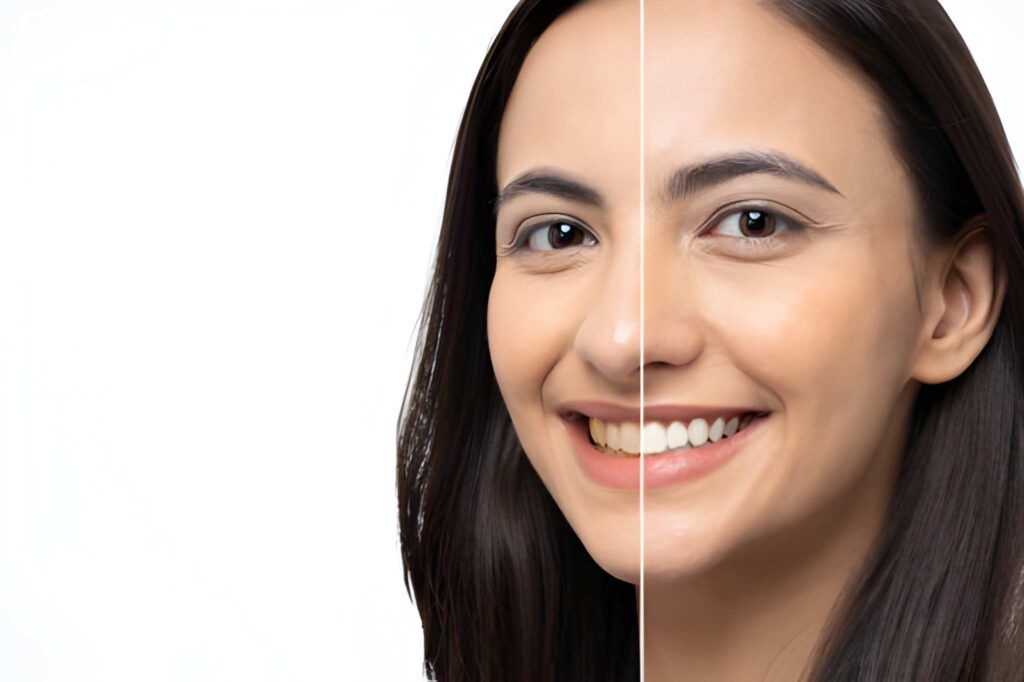A bright, white smile is a timeless symbol of health and confidence. Many people turn to teeth whitening strips as a convenient and effective way to brighten their smile at home. In this blog, we’ll explore how these strips work, their benefits, and some key considerations for using them. If you’re considering teeth whitening options in the UK, Moston Dental Practice is here to guide you through the process to achieve the best results safely.
What Are Teeth Whitening Strips?
Whitening strips are thin, flexible strips coated with a gel that contains a whitening agent, typically hydrogen peroxide or carbamide peroxide. They adhere to the teeth and work to lift stains and discolouration from the enamel. Popular brands, such as Crest teeth whitening strips, are widely used for at-home teeth whitening due to their convenience and effectiveness.
How Do Whitening Strips Work?
The active ingredients in whitening strips penetrate the tooth enamel to reach stains below the surface. These bleaching agents break down stain-causing molecules, resulting in a lighter appearance over time. Regular application according to the product’s instructions can yield noticeable results within a few days to a couple of weeks, depending on the brand and the concentration of the whitening agent.
Benefits of Using Teeth Whitening Strips
- Convenience: Whitening strips are easy to use and can be applied in the comfort of your own home. They’re a great option for those who want effective whitening without a lengthy in-office procedure.
- Cost-Effectiveness: Compared to professional treatments, whitening strips are an affordable option that can still deliver a whiter smile.
- Effectiveness: With regular use, high-quality options like the best teeth whitening strips on the market can significantly reduce stains and brighten your teeth, often several shades whiter.
- Minimal Sensitivity: Some teeth whitening methods can cause discomfort, but many whitening strips are designed to minimise sensitivity, making them suitable for a wide range of users.
Choosing the Best Teeth Whitening Strips
With many brands and types of whitening strips available, selecting the best whitening strips can be challenging. Consider the following factors:
- Brand Reputation: Well-known brands, such as Crest, have a proven track record in teeth whitening. Crest teeth whitening strips are particularly popular in the UK and have a good reputation for delivering effective results.
- Ingredients: Look for products with safe and effective ingredients like hydrogen peroxide. Avoid products with harsh chemicals that could harm your teeth or gums.
- Application Time: Some strips need only a short 5–10 minute application, while others require up to an hour. Choose a product that fits your schedule.
- Sensitivity: If you have sensitive teeth, consider strips formulated to be gentle on enamel, as they can help you avoid discomfort.
How to Use Teeth Whitening Strips Safely
To get the best results from your whitening strips while protecting your oral health, follow these guidelines:
- Read the Instructions Carefully: Every product has different usage instructions, so it’s important to follow them closely. Overuse can lead to sensitivity and enamel damage.
- Preparation: One common question is, “should you brush your teeth before whitening strips?” It’s generally recommended to brush your teeth beforehand, as it removes plaque that could block the whitening agent. However, make sure to brush gently and wait a few minutes before applying the strips.
- Placement: Apply the strips as instructed, ensuring they are evenly placed on your teeth to prevent uneven whitening.
- Timing: Do not exceed the recommended time. Over-whitening can increase sensitivity and may affect the enamel.
- Post-Application Care: Another frequent question is, “do you brush your teeth after white strips?” After removing the strips, you can gently rinse your mouth but avoid brushing immediately, as the teeth may be temporarily sensitive.
Are Whitening Strips Safe for Enamel?
Teeth strips are safe for most people when used as directed, but there are some concerns regarding enamel safety. Many users ask, “does whitening teeth hurt enamel?” or “does whitening damage teeth?”
In general, whitening strips are formulated to be gentle on enamel. However, misuse or overuse can lead to enamel erosion, increasing the risk of tooth sensitivity. Choose high-quality strips with proven safety profiles and follow usage guidelines carefully.
Conclusion
Teeth whitening strips offer a convenient, affordable way to achieve a brighter smile at home. While products are highly effective, it’s crucial to use them responsibly to protect your enamel and avoid sensitivity. For those in the UK considering a brighter smile, Moston Dental Practice provides expert advice and professional whitening options to help you achieve optimal results safely.
Whether you’re using whitening strips or considering in-office treatments, a whiter smile is within reach. Reach out to us today for personalised recommendations on teeth whitening and other dental services
FAQ
Q1: Should you brush your teeth before whitening strips?
Ans: Yes, it’s generally recommended to brush your teeth before using whitening strips to remove any plaque or food particles. However, wait a few minutes after brushing to reduce sensitivity.
Q2: Do you brush your teeth after white strips?
Ans: It’s best to wait at least 30 minutes before brushing your teeth after removing whitening strips, as the teeth may be temporarily sensitive.
Q3: Does whitening teeth hurt enamel?
Ans: Whitening strips are safe for enamel when used as directed. However, overuse can weaken enamel, so it’s important to follow the product’s instructions.
Q4: Does whitening damage teeth?
Ans: Whitening strips do not damage teeth if used correctly. Excessive use, however, can lead to sensitivity or enamel issues, so moderation is key.




